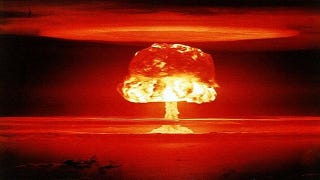Today's idea comes from someone on Twitter, who asked what if Hitler hadn't declared war on the United States after Pearl Harbor, and how the war would go: would the US focus only on Japan? And would the Soviet's still win in the East?
The answer to both questions is, undoubtedly, yes. This is a fairly popular topic on Alternate history websites, and discussed to death before, but here's my two cents anyway.
 |
| And because I'm Canadian and we don't use penny's anymore, it's really zero cents since we would round down. |
Franklin Roosevelt basically only had the political capital to go to war with Japan in the aftermath of Pearl Harbor. The Japanese had attacked America, and to many people, the fighting in Europe was still not their concern. When Hitler brashly declared war on the US a few days after Pearl Harbor, only then was America and Britain really able to coordinate to go on the offensive against both Nazism and Japanese imperialism.
So, if Hitler doesn't attack, and despite Roosevelt's concerns that Hitler may be the bigger long term threat to America, he will have to content himself with supplying Lend-Lease to the British and Soviet's until either he can find a way to bring America with him to take on Hitler, or Germany does something stupid, like, say, sink an American ship and kill American citizens. But in this scenario, that never happens, so the US basically has to just sit by and hope the British and Soviet's can fight Nazi Germany itself (and which I will get to in a moment)
However, unlike many suggestions that with the full might of America focused on Japan, that Japan would be defeated sooner, say in 1944, I disagree. I think the Pacific Campaign as we know it might be the basis for this alternate timeline as well. You have to remember that the majority of the fighting was with naval and air forces, and only a few major landing operations. It still takes time to build ships, train air crews, and eventually go on the offensive. While the American's won't be sending B-17 Flying Fortress's to Europe, it's not like they would be perfectly suited for the fighting in the Pacific, as they don't have the long range that the B-29 Superfortress had (and which only started to be built in 1942). Even then, it took until the Battle of Saipan in 1944 before even the B-29s were in range of the majority of Japanese cities. Just because the US would have more manpower, and wouldn't be focusing on Europe or North Africa, you can only send so many more Marine's and battleships to the Pacific: You still need a fleet in the Atlantic, just in case the Germans did do something. And maybe there are a few more landing craft, a few more divisions landing on beaches or squadrons of Mustangs and bombers over the skies, but it wouldn't be enough to shorten the war by a year or more. Maybe there would be a difference of a few months here and there, but in general, it wouldn't majorly change the war as we know it from OTL. By August 1945, the Japanese would be pretty much only defending their home islands and the little bits of Empire that the American's haven't yet liberated.
 |
| Liberated with excessive firepower and a belief that America is always right. |
That leads me to another point: the Manhattan Project. What would it look like in this TL? My guess: more or less the same. Just because the US is not involved in fighting the Nazi's, which the British and Americans were sure where racing for an atomic bomb, doesn't meant that the US would just ignore this potentially powerful weapon. My guess is that the Americans take over the project (with help from British, Canadian and other scientists), and would complete a weapon in time to drop on Japan as in OTL.
Why Japan? Because the Americans are in charge, and Operation Downfall, the proposed invasion of Japan, would still be a horrifying proposition to undertake. And in this TL, only the Americans would be in Operation Downfall, as the British are still dealing with the Nazi's. So, in order to prevent the upwards estimates of a million American casualties, President Truman (I'm sure that Roosevelt would still pass away in early 1945) would authorize using nuclear weapons. Plus, it would serve multiple purposes: make the Soviet's think twice about going to war with the west, and if the Nazi's are still around, convince them to give up before American joined and dropped an Atomic bomb on Germany. And, like in OTL, it would convince the Emperor of Japan to surrender and end the Pacific War.
 |
| Just a few mushroom clouds to get a point across. |
Now, for what happened in Europe? From 1942 onward, it would be a story of the Nazi's wearing themselves out fighting the Soviet's (Stalingrad and Kursk are still in the future here). During this time, Strategic bombing and fighting in North Africa is basically all the British can do. They do not have the manpower to even begin contemplating an invasion of Europe, so the war in Europe is stretched out a bit longer. But by 1943, the Nazi's will be in brutal, ignominious retreat in the East, fighting for every foot of ground as the Soviet industrial and manpower advantage comes to bear. By 1943, the British and Commonwealth powers will have driven the Axis out of Africa, and then proceeded to the invasion of Sicily and then Italy itself (which was Churchill's brainchild, being the Mediterranean strategist he was). When the Germans finally prevent the British from reaching Rome, in 1944, the British would then land in Greece or Yugoslavia, part of Churchill's plan to attack the "soft underbelly of Europe," and without the US to basically demand a Normandy landing, the attack would go on. Maybe in 1945, the British would finally land in northern Europe: maybe Normandy, but I'd be more confident in Norway. Strategic bombing, which never lived up to the promises of it's biggest supporters, really wouldn't have changed much in my opinion: morale never broke, industrial production never really slowed down. Just civilians killed, cities leveled, and hardening hatred of the enemies of the Third Reich for causing all this damage (though some unspoken questions of why the Nazi's couldn't stop it).
But by this point it wouldn't matter, because the Soviet Juggernaut would be steamrolling west, smashing all the Nazi armies in the way. Berlin would be captured by mid 1945 as in OTL, and Hitler and the leadership would retreat to the west of Germany, then maybe into France (as there would be no second front). Stalin would stop at nothing to end Hitler and the Nazi's once and for all, and "liberate" all of Europe. The dropping of the Atomic bomb doesn't convince the Nazi's to give up, so the Russians begin pushing east over the Rhine and into France itself.
At this point, the American's may finally enter the war, but with most of their troops still in the Pacific, it's an empty gesture more than anything. By the time that the first B-17s or B-29s could get to Europe in late 1945, Brussels, Amsterdam and Paris would all have the Hammer and Sickle flying over them. By the beginning of 1946, Russian troops would have reached the Pyrenees, and here is where things may get complicated: would Franco allow the Nazi's to flee to Spain, or would he prevent them from dragging him into war with the Russians? My guess is that Hitler would try to flee to South America, but be apprehended before he could. The war would be over, Hitler and the Nazi leaders executed after a trial in Moscow, and all of Europe (minus Spain, Sweden, Greece, half of Italy and Norway) would all be Communist puppet states.
 |
| Die Waffen Legt An! |
What happens after this? Well, America would be the strongest nation in the world, but with few friends. China, in this TL, would have kicked out Mao with help from the US, and the majority of the Pacific would be capitalist. But Britain would be basically under siege with the Soviet's just a few miles away across the Channel, and resentful that the US never really helped fight the Nazi's except for some boats of equipment. The Soviet's would use the diversionary tactics of Churchill, and the lack of support from America, to make Communism look better to the people of Europe, Asia and Africa, undermining the belief that democracy and capitalism was the way to go.
The Cold War of this Timeline would be between the wounded Soviet Union, the Nuclear Armed and relatively unscathed and somewhat isolationist America, and a Britain that, unlike OTL, would have to cling to the Royal Navy and a strong military to protect itself instead of letting the US protect them, turning it, basically, into Oceania from 1984.
But what do you think? What if Hitler had never declared war on the US? If you have a comment or a suggestion, either email me at tbguy1992@gmail.com or look for me on Twitter, @tbguy1992.



